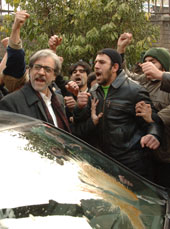 One of the most important political events in Iran is public elections. There are many elections in Iran: Majlis elections (for legislature) every four years, Assembly of Experts (whose members choose the leader) every five years, presidential elections every four years, municipal elections every four years as well as miscellaneous elections including referendums for amending the constitution or other important national events. Due to rapid political developments in early post-revolution years including assassinations and tensions between opponents and proponents of the new government, the time interval between elections was less than predicted and the number of elections held after victory of the Islamic Revolution has been higher than one may expect on the basis of a normal schedule. On average, one public election has been held in Iran every year.
One of the most important political events in Iran is public elections. There are many elections in Iran: Majlis elections (for legislature) every four years, Assembly of Experts (whose members choose the leader) every five years, presidential elections every four years, municipal elections every four years as well as miscellaneous elections including referendums for amending the constitution or other important national events. Due to rapid political developments in early post-revolution years including assassinations and tensions between opponents and proponents of the new government, the time interval between elections was less than predicted and the number of elections held after victory of the Islamic Revolution has been higher than one may expect on the basis of a normal schedule. On average, one public election has been held in Iran every year.
But how this important national event has been reflected in the Iranian cinema? The answer is not remarkable: only 15 feature films have been made in the past 30 years which have focused on election as their main theme. They include: 1. 1936 (Mohammad Reza Bozorgnia, 1980), 2. The School Mayor (Mohammad Baqer Khosravi, 1997), Democracy Test (Mohsen Makhmalbaf, 1998), 4. Rain Man (Abolhassan Davoudi, 1999), 5. Under the Skin of the City (Rakhshan Bani-Etemad, 2000), 6. Mr. President (Abolqasem Talebi, 2000), 7. Party (Saman Moqaddam, 2000), 8. The Naked Night (Saeed Soheili, 2001), 9. The Secret Ballot (Babak Payami, 2001), 10. Our Times (Rakhshan Bani-Etemad, 2001), 11. Tic (Esmaeil Fallahpour, 2001), 12. 5 in the Afternoon (Samira Makhmalbaf, 2003), 13. The Lizard (Kamal Tabrizi, 2003), 14. The End of the World (Abolfazl Saffari, 2007), and 15. Motherland (Abolhassan Davoudi, 2008).
Presidential candidates have used television clips for publicity since 1997 which have been mostly made by major filmmakers of the Iranian cinema such as Kamal Tabrizi, Rasoul Sadr Ameli, Rasoul Molla-Qolipour, and Ahmadreza Darvish. However, they will be discussed elsewhere. In recent years, many Iranian documentarians have paid attention to election and some of them have made good documentaries including the 11-minute Porseh by Pirouz Kalantar (a professional Iranian documentarian), which focused on the 8th presidential election. This issue will be also discussed in a separate article. Pre-revolution cinema will not be discussed here because in that period only one film, that is, Mohammad Motevasselani’s Compromise (1974), was made about elections. Although there were parliaments at that time, but the political system was despotic. Compromise was a comedy about election of a local council in a city and showed how its chairman was corrupted through power and capital relations. Therefore, a short review of the above 15 films will also produce a picture of elections in the Iranian cinema.
SUBSCRIBE

